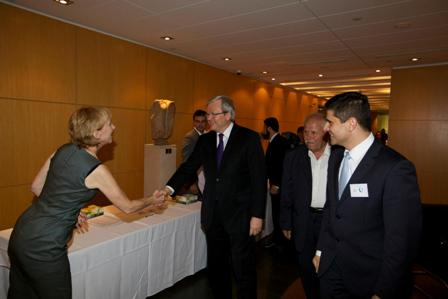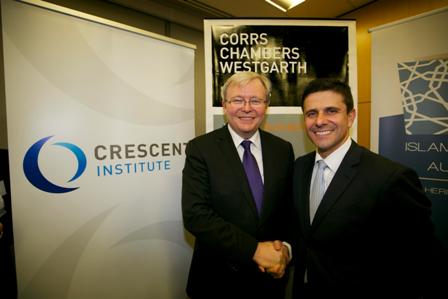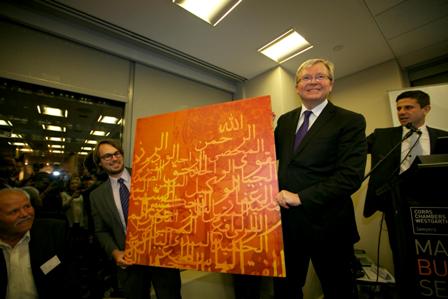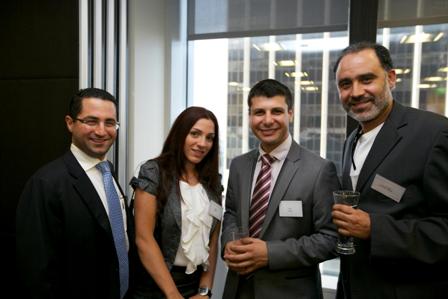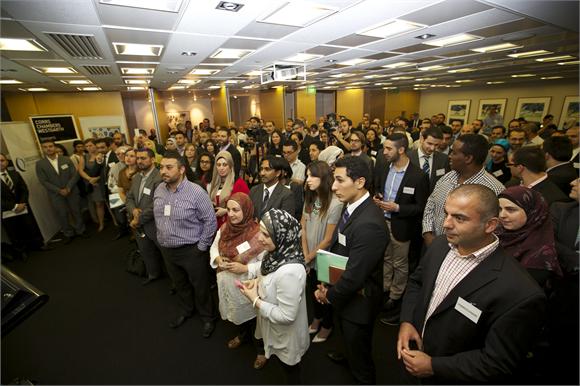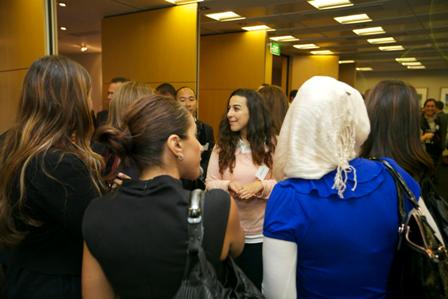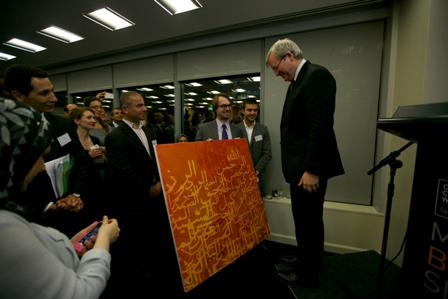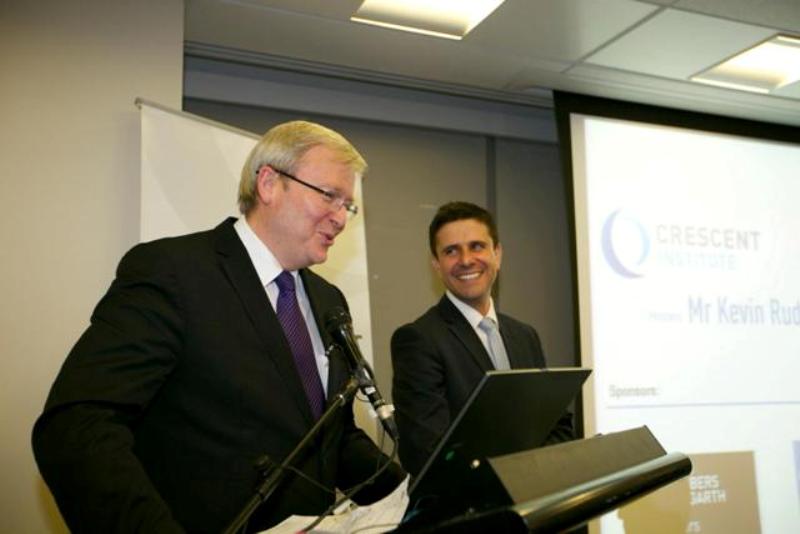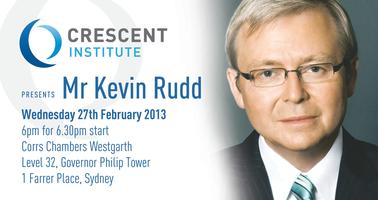

Sada-e-Watan
Sydney ™
sadaewatan@gmail.com


Former
Prime Minister of Australia Hon. Kevin Rudd Launches the Crescent Institute in
Sydney City
(Exclusive Report to
Sada-e-Watan by Public Relations Department of the Crescent Institute)
The Crescent
Institute was proud to welcome The Hon. Kevin Rudd MP, former Prime Minister and
Foreign Minister of Australia.
The event was widely anticipated and attracted a record crowd from across the
Australian professional and corporate spectrum, including law, banking and
education. Attendees headed across the city to Corrs Chambers Westgarth in
Governor Phillip Tower, where the night's proceedings were hosted.
Guests mingled among friends, established new connections and enjoyed the
canapés against the backdrop of the city skyline. Hon.Kevin Rudd was introduced
by Mr Talal Yassine OAM, the patron of the Crescent Institute and managing
director of Crescent Wealth, Australia's first Islamic and ultra-ethical
superannuation fund.
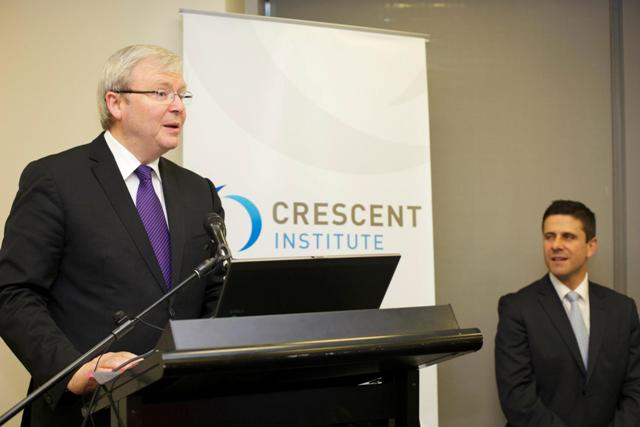
The
Mandarin-speaking former Prime Minister was light-heartedly challenged by Mr
Talal Yassine to deliver the speech in Arabic, to which the Labor MP replied: "Inshallah"
(God willing, in Arabic).
In his address, Mr Rudd covered several key themes including multiculturalism,
the economy and Australia's place in the world.He began by thanking all
attendees "for having me in your midst", and spoke at length about the value of
Australia's "multicultural reality", which he observed the country had been able
to craft successfully.
Hon. Kevin Rudd noted that the difference between Australia's Muslims and recent
generations, and those of Anglo Celtic background, is "a few boatloads". A
passionate supporter of Australia's multicultural program, Mr Kevin Rudd said it
had given the country "strength, energy and dynamism". He pointed out that the
international experience had shown that where multiculturalism worked well,
communities had prospered.
Earlier, Mr Talal Yassine had appealed to the audience to 'like' the Crescent
Institute on Facebook. When Mr Kevin Rudd said that he would be doing just that,
Mr Talal Yassine responded, "You have my vote". Mr Rudd then quipped: "Just
organise several more million of those."
Another key issue Mr Rudd addressed during his speech was the economy and its
resilience under Labor during - and since - the Global Financial Crisis. Mr
Kevin Rudd outlined the three fundamentals that the Labor government persued
with vigour in contrast to the opposition's strong view about the Government's
course of action. In particular he highlighted the opposition's strong
resistance to the Government's increase in national expenditure to underpin the
country's economic performance and fortify it against the GFC.
Mr Rudd also made a strong comparative case on Australia's outstanding
performance under Labor noting that it has been able to maintain Australia's AAA
rating with all three international agencies, maintain a sub 10 percent debt to
GDP ratio as well as ensure unemployment remained around the 5 percent mark in a
volatile global economy.
Following his speech, Mr Kevin Rudd tackled a range of questions from the
audience about education policy, the Labor Party leadership and Palestine. At
the end of the night's proceedings, The Crescent Institute presented Mr Rudd
with an original Australian Islamic artwork painted by Sydney based artist , Mr
Peter Gould.
The Crescent Institute would sincerely like to thank Mr Kevin Rudd for his
attendance and his address.
Additionally the Crescent Institute will present a number of other Leadership
Series events this year featuring some of the country's thought leaders and
business professionals.
The Institute would also like to thank all members and guests who attended the
evening. The event would not have been possible without them, and the support of
Corrs Chambers Westgarth, Fujitsu and Crescent Wealth .
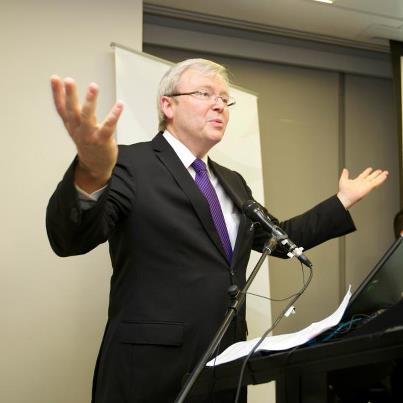
Former Prime Minister of Australia Hon. Kevin Rudd's Address to the Crescent Institute
(Wednesday, 27 February 2013)
Thank you for very much, Talal, for that very kind and welcoming introduction and also to Michael and our friends here at Corrs for laying open their premises here this evening.
Thank you for the kind invitation to be here with you at the Crescent Institute this evening. It’s an honour to be among you. I know we have many, many Muslim-Australians here this evening, so to all my Muslim brothers and sisters: thank you for having me in your midst at this gathering.
One of the great strengths of this country is what we trip over lightly in our language and that is its multicultural reality. These are things to hold quite preciously and to hold quite tight. Not all countries have this happy experience.
The fact that we have been able to craft it and craft it relatively successfully against all the international examples, I think, speaks well of the Australian people at large.
And those of you and those like all of us, apart from the First Australians, who have chosen to come to these shores to make Australia their home. The only difference between our Muslim brothers and sisters, who may have come in recent generations, and Anglo-Celtics like myself is simply the space of a few boatloads in between.
My lot arrived here at Sydney Cove in chains in 1790. Not an entirely good family background. Convicts complete.
In fact one of the great joys of becoming Prime Minister of this country is this other religious organisation called the Mormons then do your comprehensive family tree. And it’s a delight. You never have time to do these things yourself. And I knew I had this criminal forbear so I alerted the good Mormons, Church of Jesus Christ Latter Day Saints, that this was the case. And they came back and saw me twelve months later with these two bound leather volumes but looking a little ashen-faced. They said, “Prime Minister, we’ve discovered that you have five criminals in your family history.”
That was a great preparation for politics. I joke.
But the great strength of Australia’s multicultural reality is that it is that. It is not a notion, it is a reality. I know things can be rough on the way through. I am not a Pollyanna who says everything is sweet. I know those of our Muslim brothers and sisters, and particularly those who wear headscarves, that you cop it. I actually understand that. I am not going to gloss over that. I’m sorry that you do. I think with the passage of time, you won’t.
As Australia matures and embraces the diversity of our ethnicity and where we come from, and as this multicultural reality unfolds and develops and gains strength, and it’s own inherent momentum, these differences of the past will begin to dissolve. As already in many parts of Australia they are dissolving.
So I thank you for choosing to make Australia your home. Thank you for becoming part of our multicultural reality.
As I said I do not dismiss lightly the experiences of prejudice of people who come here in the first generation. My word of comfort is this. When the Irish firs came here, the English despised them. My forebears were part Irish. After the Irish became acceptable and the Italians and Greeks came, the Irish despised them. When the Greeks and the Italians became established and then others came from South East Asia and East Asia, they in turn began to despise them. And when our Muslim brothers and sisters have come from across the Muslim world and so too has the experience not been dissimilar.
The only strength and virtue of the story I just told you is – it simply passes with time. And having the patience and forbearance to understand that and see it through, as we proudly welcome our Muslim brothers and sisters into the most senior positions in our Australian society, and in our Parliament and across out business community, is increasing evidence that that process is underway.
I’m pleased to count as one of my great personal friends Ed Husic who’s the first Muslim to be elected to the House of Representatives. Ed’s the Member for Chifley and, with great pride, I remember him being sworn into the House of Representatives taking his oath of office on a copy of the Koran.
And we are now at the position in Australia where oaths of office are either taken on the Bible, as I do, on the Torah as some of our Jewish members do and now on the Koran as well. And of course we have those who have no religious affiliation at all.
So I think it’s a testament to the strength of who we are as a people. There’s something else about it as well. And why I’m such a passionate supporter of our multicultural reality. You give us strength. You give us energy. You give us dynamism. You have new thresholds to cross.
If people have become comfortable after being in this country for several generations, guess what? They need to be challenged afresh – with new ideas and new approaches and new levels of energy with which to approach the task of building a nation and building an economy and strengthening the fabric of our local societies.
So that also is why I am a passionate supporter of the immigration program and our multicultural reality, because it gives us dynamism and creativity. And think across this vast continent of Australia where we have this great admixture of people from multiple races and multiple religious traditions, and what we can produce as its own unique creative output as these cultures are blended in a way which actually contributes something new and fresh to the world.
In my electorate recently, in fact only yesterday, I visited the Aboriginal Performing Arts Centre which has the vision of becoming the Indigenous NIDA. It’s a group already of 100 young Indigenous artists across all the artistic media. And I said to them in a group, they’re bright-eyed, bushy-tailed from all over Queensland, some had just come off communities in the Cape and some urban centres, and I looked at them and I just saw the quality of their voice and their dance and their movement and their creativity.
We are creating something quite new here. Part of the future Australian identity will be increasingly not just the great traditions we’ve inherited from, let’s call it, the Anglo-Saxon past: the notion of the independence of the laws and Westminster and Parliamentary elections and the rest but, at a cultural level, there’s great fusion which is underway and led, I believe, by our Indigenous Australians who are becoming part of the new international cultural identity of what Australia is.
When I was Prime Minister I remember going with Therese to Japan. In an audience we had with the Emperor and his wife there was an exhibition on at the Museum of Tokyo by a great Aboriginal artist whose name is Emily. You may know her works. She took to the brush and began painting at the age of 79. These are stupendous works of art. These now form in the international art world the view of a modern, creative, Australian art movement – led by indigenous Australians.
Well, in our wider multicultural reality, so too do we welcome all traditions and their contribution to that. That’s part of the excitement of being in this country. And at a basic level can I just say this? Thank you one and all for coming to Australia to liberate us from 150 year of Anglo-Celtic cuisine.
Can you imagine eating that stuff for another 150 years?
So there is richness to the tapestry of our multicultural reality. It’s not just a set of fine words. It’s played out in the reality of each day, in families and communities but also in the national identity we’re constructing.
If you look across of the world, when this has worked well we have prospered as a global civilisation.
When we have degenerated into our separated boxes and decided that in fact conflict or wars is the only way in which we can solve differences of a confessional nature or a racial nature, then we’ve sown the seeds for our own destruction.
I’m reminded of the extraordinary contribution of Islam through the great work done by Islamic scholars for generations after the collapse of the Eastern Roman Empire. Basically the collection of the Ancient Books of the Western Learning and their preservation in the great Muslim libraries from the time of the Prophet through to about the 15th Century when, finally, the West rediscovered, after about 1000 years, the learning of the Greeks and the Romans which had effectively been preserved in Islamic libraries across the world.
And then at the time of great conflict in Spain, prior to the wars undertaken by Ferdinand and Isabella, the School of Toledo in Spain where you had this extraordinary aggregation of scholars who were Christian, Jewish and Muslim working side-by-side in translating these works into multiple languages of the then modern world at the dawn of the Renaissance – works which had been preserved by Muslim scholars for thousands of years which came out of the Great Learnings of Greek and Roman worlds.
That is us out our best, frankly, and there are historical examples of that all across the world. Tragically we know of the alternatives as well.
So as we husband this multiculture that is modern Australia, let us bear in mind that there are great civilizational traditions of the past which have blended well and we can do that again here in this thing we call, proudly, the Commonwealth of Australia.
That was my first point. My first point of three was about the strength of our multicultural reality and where all you good folk fit into it.
The second is, given we have so many folk from the business community, where we now fit in the global economy.
Can I just say this? If you are a business person doing business person in Australia and you read the eternal prophets of doom about how this economy is tracking in the future, take pause, take a very deep breath and bring out a comparative table of economic data across every major advanced economy in the world.
Right here in Australia, partly because of the leadership this Government has provided and partly because of our location in Asia, we have managed to come through this extraordinary episode in economic history called the Global Financial Crisis in great strength.
What are the basic measures of this?
Number one, of all the modern, advanced economies of the world, this is the only one that came through without going into recession.
Number two, we avoided, as a result, mass unemployment. Europe still has double-digit plus unemployment – an average of 11.7 per cent as we speak. In America they’ve just bought it down to under 8 per cent. Here we kept unemployment with a 5 in front of it.
And what’s the difference? In times past when Australia has gone into recession, when we imported that from other countries, our unemployment numbers have ended up being worse than the rest of the world and we’ve taken much longer to recover. That was the pattern of the early 90s recession where we generated again double-digit unemployment and kept it running for the better part of a decade.
The news this time is good. We’ve avoided that. We have half the unemployment rate than the rest of the major advanced economies around the world and the enormous social destruction which that entails. Think today of the 25 per cent unemployment rate of modern Spain, with a youth unemployment rate of 52 per cent. Think that we’ve avoided that bullet by what we’ve managed to do here in Australia.
Of course the third thing that stands out so clearly across all the measures is that not only have we avoided recession, not only have we avoided mass unemployment, but we’ve also grown our economy as well.
This economy called Australia is now 13 per cent bigger in real terms than it was five years ago. The rest of the world’s economy, both in Europe and the United States, is either the same size as it was five years ago or still smaller in the case of Europe. So, therefore, the opportunities for business and activity are greater here than most other advanced economies in the world.
You’ll hear a lot in the period ahead in what is called the sound and fury of the Australian national election about debt and deficit. Let me just say this to you folks about those two points.
We have managed to execute what we have done through a vigorous fiscal strategy, a stimulus strategy and avoiding any bank collapses by, of course, in engaging what is necessary for borrowings to keep the economy going.
We’ve emerged from all of that with one of the lowest budget deficit to GDP ratios and one of the lowest net debt to GSP ratios of all the advance economies in the world. When you look around the world, let me give you one figure: our net debt to GDP ratio peaked last year at about 9.9 per cent. Average net debt to GDP ratio across the rest of the advanced economies is 94 per cent.
Let’s put this into context. You can have a relative debate here which I’m sure Mr Abbott will engage in soon about our debt number increasing from 0 to 9.9 per cent without putting into context of the rest of the world up there at 94/95 per cent. Nor the fact that we have already turned the corner and our net debt to GDP ratio is already contracting and that was part of the plan as well.
Had we not borrowed in order to preserve the strength of the economy, keep it going and avoid mass unemployment, where would we be today? Let me tell you – the economy, like all other economies around the world, would have fallen into a hole.
The last piece of evidence on that in terms of where we are as an economy, I refer you again to the fact that what are the final conclusions of the international credit rating agencies? Three of them – Standard and Poor’s, Moody’s and Fitch. Tis one of the few economies in the world which from those three ratings agencies has a AAA credit rating. So I’d say to Mr Abbott it’s so bad that we have a AAA credit rating from the three independent credit rating agencies in the world. Britain just got downgraded to AA+ and you’ll see lower ratings for many other economies in the world as well.
So when you’re embarking on your consideration of where this economy goes in the year ahead, can I just say, relative to where the rest of the world, have some confidence about where we are now.
It’s not perfect. There are stacks of things to do. But frankly the foundations and the fundamentals are reasonable.
And our vision for the future is how do we diversify this economy further. I don’t want and never have wanted Australia to just be a quarry and a beach. I don’t want it to simply be a country where we dig stuff up out of the ground and send it abroad. Or where we have a whole bunch of tourists who come and enjoy our naturally beautiful beaches. Fine as that is. We’re capable of something much bigger, better and broader.
As I said at the time of the 2007 election, I never wanted to be the Prime Minister of a country which didn’t make things anymore and I think that’s a valid vision for the future as well. And our services industry, led by international legal firms such as Corrs or our international financial houses, our sale of education services, our sale of health services, our sale of engineering services around the world – this is all about broadening the base of this economy for the future.
Which brings me to my final point. Wesley, the father of modern Methodism always said this: when you’re preaching a sermon speak in three points; if you only leave two, they don’t think you’ve got much to say, if you leave four then they’ll forget what the first one is. That was Wesley’s instruction about how you construct a public speech about three hundred years ago.
So let me leave you with this third point: multiculturalism is strong, it’s important for us. It’s one of our core national assets and strengths. Our people are our core asset and our multiculture with all of its diversity is an asset within an asset. Knowing the strength, fundamental strengths of our economy, and having some sense of the vision of how we want to diversify our economy, that also speaks well for our future.
But I conclude by this, which is: our challenge for the future as Australians also is to carve out a space for ourselves in the region and the world in which the voice and the name of this country we proudly call Australia holds its head high. Now across the world in the last five years or so, we’ve been hard at work on that.
Five years ago there was no such thing as the G20. Now there is. We had a lot to do with putting that together. For the first time in the 200 year plus history of this country we now sit around a table with the heads of Government and the finance ministers of the 20 largest economies in the world.
It was that institution which helped break the collapse of the global economy in March 2009 when we met at the London G20 Summit.
Furthermore, we’ve been active in the region and encouraging the Americans and others to become active in the principle institutions of Asia. And we’ve had success on that score, too, by welcoming the States into the East Asian Summit.
We’ve also had the temerity to put our hand up and say, “We should become a member of the United Nations Security Council”. What an unpatriotic act! That was irony, by the way.
And so remarkably in this country it became a matter for partisan discussion and partisan divide.
I don’t know of any other country in the world where a government puts it hand up and says we’re going to put our name forward to be elected to the UN Security Council, which is the absolute apex of the world’s deliberative bodies on how you deal with current crisis in global security including the civil war unfolding in Syria today, and does not have bipartisan support. I couldn’t believe that we would actually not have the alternative government of Australia supporting that proposition in the four years of campaigning in which we engaged.
The result? We won a near record result in the first round ballot for our position on the United Nations Security Council. 140 + nations supported us, countries from all around the world and I’m pleased to say, most countries from the Muslim world as well.
So, whether it’s the G20, whether it’s our role in Asia, whether it’s now being a member for the next two years on the United Nations Security Council, we’re doing something creative in the eyes of the world as well. And that is a good thing in terms of how we see ourselves. We’re not a subset of some other country. We are who we are. And I think we have a creative voice to add to the councils of the world in dealing with some of the more continuing intractable problems in international affairs.
I always say that Australia is a middle power with both global interests and regional interests. We’re concerned about what goes on in the streets of Tripoli, in the streets of Benghazi. We’re concerned about whether or not students from Libya are able to complete their university education in this country. We’re concerned about a fledgling democracy in Syria. And we work closely with the transitional arrangements in Egypt where we look to assist in practical ways when we can to make sure that the flower of democracy in that country is not strangled by other forces. We have now doubled and tripled our financial support to the Palestinian Authority. We now have, for the first time, a strategic dialogue with the countries of the Gulf Cooperation Council. We have a free trade agreement negotiation almost concluded with the economies of the Gulf.
We now, with the largest Muslim country in the world, Indonesia – next door to us, have an extraordinarily close relationship.
We have both regional interests and we have global interests but we also have this about us: an animating set of universal values which we hold to be true. Values of freedom, values of fairness and values compassion, which are also deeply present in the tradition of Islam.
These values are fundamental in core to how we engage the rest of the world as well. We don’t see these values as mysteriously expiring at the Australian continental shelf. They should inform what we do in the world at large. So that’s who we are – animated by what I would call a process of creative middle power diplomacy.
So have confidence my friends. This is not a bad country – it’s got some great strengths, we’ve got our weaknesses but we’re smart enough usually to deal with our weaknesses and to get on the with business of carving out our place in the region and the world.
Confident of our multiculture.
Confident of our values.
Confident in the strength of our economy in the world.
Confident also about the voice we can add to the councils of the world to deal with some of the intractable problems which have blighted the history of the world for decades and in some cases centuries.
Thank you for your hospitality this evening, I look forward to discussing these matters with you further.
